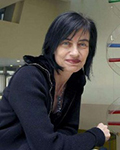A Personal Perspective: Why Increasing the Advancement of Women in Neuroscience Matters
May 29, 2015

Mara Dierssen is a senior scientist at the Centre for Biomedical Research on Rare Diseases and the president of the Spanish Society for Neuroscience. She shares her insight about the challenges women face in neuroscience from her experience working and advancing in the field, and she offers advice to other women pursuing a career in neuroscience.
Access to the full article is available to SfN members.
Neuronline is a benefit of SfN membership. Renew your membership now to make sure you don’t lose access.
Speaker

Mara Dierssen, PhD
Mara Dierssen is the group leader of the Neurobehavioral Analysis Laboratory at the Center for Genomic Regulation in Barcelona, Spain, and holds a professorship at the Ramón Llull University of Barcelona. Her current work is devoted to functional genomics of mental retardation and neuropsychiatric disorders. Her laboratory is investigating specific links between cognitive impairments and memory disorders in patients with Down syndrome using genetically engineered mouse models.
1 of 5 articles left
Login
or
Become a Member
to unlock content


.png?h=1763&w=3125&la=en&hash=B2439C2768576BED6405672E5CD5CF8CB1AA375F)




